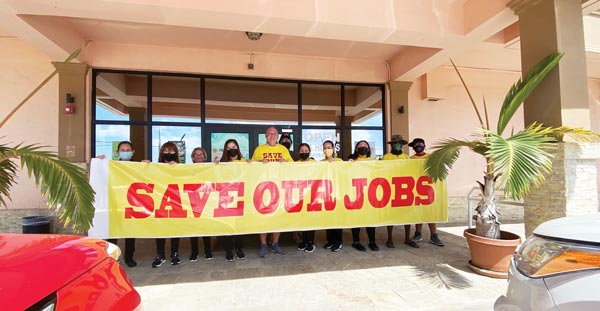‘New law that doubles tax may force shutdown’

Saipan Vegas Resort and Club 88 consultant Gus Noble is joined by Saipan Vegas Resort employees in this photo. (Contributed photo)
A company that owns two e-gaming clubs in the CNMI expressed disappointment yesterday over the passage of a bill and its enactment last week—all without any public hearing and no notice to affected businesses—and described it as unfair because it doubles their tax burden.
Saipan Vegas Resort and Club 88 consultant Gus Noble said yesterday that this law renders their businesses financially unstable and could force them to shut down, resulting in the loss of jobs for over 70 Saipan local residents.
Noble said they are already paying the highest taxes on the island because they paid in advance of a 15% gaming tax. Noble said they’re also paying the 5% Business Gross Revenue and Tax, plus a $100,000 annual license fee per venue per year.
This, he said, is on top of the regular CNMI income tax.
“So we’re already really heavily taxed,” he pointed out.
Last week, Monday, Gov. Ralph DLG. Torres signed into Saipan Local Law 22-6, House Local Bill 22-8, S1, that imposes a local license fee on all electronic gaming devices on Saipan and poker amusement machines in the same e-gaming premises on the island.
The new law imposes a $2,500 or 15% net gaming proceeds, whichever is greater, on all electronic gaming devices on Saipan, including poker machines that are located within e-gaming facilities or hotels. The new fee will be on top of the existing similar amount of CNMI-wide fees imposed by current law.
House Local Bill 22-8 authored by House floor leader Ralph N. Yumul (R-Saipan) was passed by the Saipan and Northern Islands Legislative Delegation last June 23. It is named the Third Senatorial District Electronic Gaming Devices License Fee of 2021.
Yumul stated in the bill that, with the enactment of the Commonwealth casino law (Public Law No. 18-56), no new poker machines were allowed to be registered in the CNMI after April 2015. This means, Yumul said, that collections from poker fees will continue to decrease, yet Saipan is dependent on poker fees to pay for local programs, subsidizing local non-profit organizations, local projects and, most importantly, the Saipan Higher Education Financial Assistance program.
Noble pointed out, though, that the Saipan and Northern Islands Delegation just passed the bill without giving them the opportunity to review it and challenge it.
“No opportunity for the public to make any input or the business affected to make any public input. Just in the dead of night with not public consultation at all,” Noble said.
Although the purpose of the tax is ostensibly to raise revenue, he said this may have the opposite effect of causing the e-gaming industry in the CNMI to shut down entirely.
“If this happens, despite the imposition of a new tax, the citizens of the CNMI will receive zero revenue from e-gaming,” he said.
Noble said the bill, as a local law, didn’t need to go to the House or the Senate for review or debate, and was in essence a “backroom” deal with no opportunity for public comment. Noble said they were given no chance to present their comments and protect the employment of over 70 local employees.
“This is not how a democracy should work. Backroom deals done by politicians with clear conflicts of interests cannot be tolerated by the CNMI people and its voters,” he said.
Noble noted that Yumul had a clear conflict of interest at the time he introduced the bill to the delegation as he previously recused himself from the House Gaming Committee because his brother, Ray Yumul, is the current chief executive officer of Imperial Pacific International (CNMI) LLC.
Noble said Yumul’s bill doubles the tax on IPI’s only competitor.
Saipan Vegas also operates Saipan Country Club, the oldest golf course on Saipan, as well as Saipan Vegas Hotel.
Noble said Yumul introduced the bill that directly benefits his brother.
“It is such a clear and undeniably conflict of interest. It’s just devastating,” he said.























